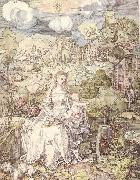Wholesale Oil Painting No Minimum |
|||||||||||
|
|
|||||||||||

|
|||||||||||
|
|
|
||||||||
Albrecht Durerb.May 21, 1471, Imperial Free City of Nernberg [Germany] d.April 6, 1528, Nernberg Albrecht Durer (May 21, 1471 ?C April 6, 1528) was a German painter, printmaker and theorist from Nuremberg. His still-famous works include the Apocalypse woodcuts, Knight, Death, and the Devil (1513), Saint Jerome in his Study (1514) and Melencolia I (1514), which has been the subject of extensive analysis and interpretation. His watercolours mark him as one of the first European landscape artists, while his ambitious woodcuts revolutionized the potential of that medium. D??rer introduction of classical motifs into Northern art, through his knowledge of Italian artists and German humanists, have secured his reputation as one of the most important figures of the Northern Renaissance. This is reinforced by his theoretical treatise which involve principles of mathematics, perspective and ideal proportions. His prints established his reputation across Europe when he was still in his twenties, and he has been conventionally regarded as the greatest artist of the Renaissance in Northern Europe ever since. |
||||||||
|
|
||||||||
The Virgin among a Multitude of Animals
The Virgin among a Multitude of Animals Painting ID:: 63649 |
1503 Pen and ink and watercolour on paper, 321 x 243 mm Graphische Sammlung Albertina, Vienna The Virgin holds the Christ child, who ignores the natural wonders around him and points towards Joseph. The small figure of Joseph stands near the house and he appears to be conversing with a stork. A closer examination reveals that many incidents from the story of the Nativity are being told. An angel swoops down from the sky to give news of Christ's arrival to shepherds tending their flocks on the hillside. On the left side of the picture, the ships of the three Kings have arrived and the Magi are setting off with their retinues. This charming picture is distinguished from countless depictions of the Nativity by the wonders of nature which D?rer has included. The parrot, perched on the pole by the Virgin's side, was the prophet which announced her arrival. D?rer drew this bird from an earlier study. The artist loved parrots and he later acquired several live specimens on his trip to the Netherlands in 1521. Just beneath the parrot in the watercolour is a green woodpecker, ready to hammer out a song of praise. In the bottom left corner a large stag beetle teases the Virgin's faithful but sleepy dog and a butterfly has gently alighted on its back. All the creatures have a meaning. The chained fox is a symbol of evil. The two owls around the tree stump represent the forces of darkness, but Christ's appearance has deprived them of their power. In the bottom right corner is a crab, like the one which D?rer painted on his first visit to Venice. Among other creatures are a snail, a dragonfly, a pair of swans, a robin, a moth and a water wagtail. D?rer has delicately added colour wash to his pen and ink drawing, blue for the sky and water, a range of greens for the landscape and traces of red for the flowers. The resulting work is extremely delicate, portraying the Virgin and Child with great tenderness and a touch of humour. Two other versions of this picture exist and the composition may well have been intended as a study for a proposed engraving.Artist:D?RER, Albrecht Title: The Virgin among a Multitude of Animals Painted in 1501-1550 , German - - graphics : religious 1503 Pen and ink and watercolour on paper, 321 x 243 mm Graphische Sammlung Albertina, Vienna The Virgin holds the Christ child, who ignores the natural wonders around him and points towards Joseph. The small figure of Joseph stands near the house and he appears to be conversing with a stork. A closer examination reveals that many incidents from the story of the Nativity are being told. An angel swoops down from the sky to give news of Christ's arrival to shepherds tending their flocks on the hillside. On the left side of the picture, the ships of the three Kings have arrived and the Magi are setting off with their retinues. This charming picture is distinguished from countless depictions of the Nativity by the wonders of nature which D?rer has included. The parrot, perched on the pole by the Virgin's side, was the prophet which announced her arrival. D?rer drew this bird from an earlier study. The artist loved parrots and he later acquired several live specimens on his trip to the Netherlands in 1521. Just beneath the parrot in the watercolour is a green woodpecker, ready to hammer out a song of praise. In the bottom left corner a large stag beetle teases the Virgin's faithful but sleepy dog and a butterfly has gently alighted on its back. All the creatures have a meaning. The chained fox is a symbol of evil. The two owls around the tree stump represent the forces of darkness, but Christ's appearance has deprived them of their power. In the bottom right corner is a crab, like the one which D?rer painted on his first visit to Venice. Among other creatures are a snail, a dragonfly, a pair of swans, a robin, a moth and a water wagtail. D?rer has delicately added colour wash to his pen and ink drawing, blue for the sky and water, a range of greens for the landscape and traces of red for the flowers. The resulting work is extremely delicate, portraying the Virgin and Child with great tenderness and a touch of humour. Two other versions of this picture exist and the composition may well have been intended as a study for a proposed engraving.Artist:D?RER, Albrecht Title: The Virgin among a Multitude of Animals Painted in 1501-1550 , German - - graphics : religious |
|||||||
|
CONTACT US |

